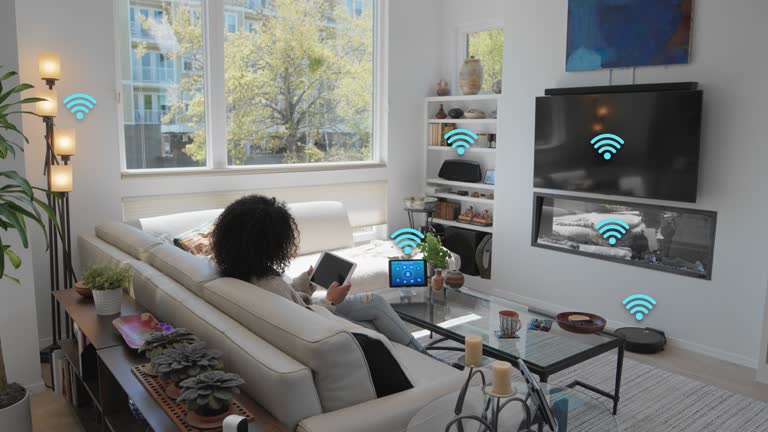
Financial Benefits of Smart Home Technology: Is It Worth the Investment?
Share
In today's rapidly evolving technological landscape, smart home technology has emerged as a revolutionary force, offering a multitude of advantages. Among these, the financial benefits of smart home technology stand out, promising homeowners significant savings and enhanced convenience. But what exactly are these financial benefits, and is investing in smart home systems truly worth it?
For tech professionals and enthusiasts, understanding the potential economic advantages of smart home technology is crucial. It not only provides insights into cost-saving measures but also highlights the long-term value of integrating technology into our daily lives. As the demand for sustainable and efficient living grows, the role of smart home devices becomes increasingly prominent. How automation reduces utility costs is a topic worth exploring for those keen on optimizing their home expenses.

Energy Efficiency and Utility Savings
One of the primary financial benefits of smart home technology is its ability to enhance energy efficiency. Smart thermostats, for instance, can learn your schedule and preferences, adjusting temperatures accordingly to minimize energy consumption. This leads to substantial savings on utility bills. According to the U.S. Department of Energy, homeowners can save up to 10% annually on heating and cooling by simply using a programmable thermostat.
Moreover, smart lighting systems, which can be controlled remotely or set to operate on schedules, further reduce electricity usage. By ensuring lights are only on when needed, homeowners can significantly cut down on unnecessary energy expenses. For more insights on how smart home technology contributes to sustainable living, visit How IoT is Changing Sustainable Living.
Water Conservation and Management
With water scarcity becoming a pressing global issue, the role of smart home technology in water conservation cannot be overstated. Smart irrigation systems, for instance, optimize water usage by adjusting watering schedules based on weather conditions and soil moisture levels. This not only conserves water but also reduces water bills for homeowners.
Additionally, smart water leak sensors can detect leaks early, preventing costly water waste and damage. By alerting homeowners to potential issues, these sensors can save thousands of dollars in repair costs. Learn more about the cost implications of water management with smart technology at Water Leak Sensor Cost.
Enhanced Home Security and Insurance Benefits
Investing in smart home security systems not only provides peace of mind but also offers financial advantages. Many insurance companies offer discounts on premiums for homes equipped with advanced security systems. These systems can include smart cameras, motion detectors, and door/window sensors, all of which contribute to a safer living environment.
The ability to monitor and control your home remotely adds an extra layer of security, deterring potential intruders and reducing the risk of theft. This can lead to lower insurance costs, making smart home security systems a financially sound investment.
Increase in Property Value
As technology continues to integrate into our daily lives, homes equipped with smart systems are becoming increasingly attractive to buyers. A home with smart technology is often perceived as modern, efficient, and forward-thinking, which can enhance its market value. When it comes time to sell, homeowners can potentially command a higher price, making their initial investment in smart home technology worthwhile.
For those considering investing in green home automation, the potential increase in property value is an important factor. Explore more about this at Investing in Green Home Automation.

Long-Term Savings and Sustainability
The financial benefits of smart home technology extend beyond immediate cost savings. By reducing energy and water consumption, homeowners contribute to a more sustainable future, aligning with global efforts to combat climate change. This not only benefits the planet but also ensures long-term financial savings as resources become scarcer and more expensive.
For tech enthusiasts passionate about eco-friendly living, exploring the latest innovations in smart home technology is essential. Discover some groundbreaking eco-innovations at 15 Eco-Innovations for Sustainable Homes.
FAQs
Q1: How does smart home technology save on utility bills?
A1: Smart home technology, such as programmable thermostats and smart lighting, optimizes energy usage, leading to reduced utility bills. By automating and controlling systems remotely, homeowners can ensure efficient energy consumption.
Q2: Can smart home technology improve home security?
A2: Yes, smart home security systems offer advanced features like remote monitoring, motion detection, and real-time alerts, enhancing home security and potentially lowering insurance premiums.
Q3: Is investing in smart home technology worth it for property value?
A3: Homes equipped with smart technology are often more attractive to buyers, potentially increasing property value. As demand for modern, efficient homes grows, smart home technology becomes a valuable asset.
